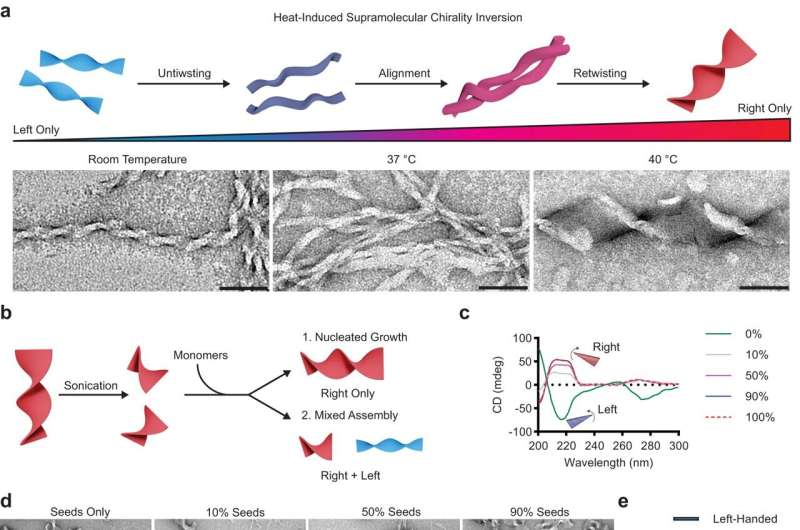This article has been reviewed according to Science X's editorial process and policies. Editors have highlighted the following attributes while ensuring the content's credibility:
fact-checked
trusted source
proofread
Researchers design novel drug delivery system that could reverse Alzheimer's disease impact

University of North Carolina at Chapel Hill researchers have developed a new drug delivery platform that harnesses helical amyloid fibers designed to untwist and release drugs in response to body temperatures.
A new research paper published on Jan. 26 in Nature Communications reveals groundbreaking structural details into how diseases form much like Alzheimer's disease. With this knowledge, the group may have uncovered a unique mechanism to reverse both the deposits and their impact on those suffering from these conditions.
UNC-Chapel Hill researcher Ronit Freeman led a research group with investigators from the Lynn lab at Emory University to look at the core beta amyloid-42 peptide, the key portion driving amyloid plaque assembly and deposits in the brains of patients with Alzheimer's disease. By creating synthetic variations of the peptide in the lab, they were able to discover how to control the way that these molecules assemble and twist.
"The ability of these amyloid materials to be untwisted and degraded highlights potential for treatments modifying and subsequently reversing plaques found in Alzheimer's, and other neurodegenerative diseases," said Freeman. "We know that the direction of the amyloid fibril twists is associated with different disease progression states. Imagine that by a simple treatment, we could modify amyloids to change their shape and disappear—this is what our discovery might enable us to do in the future."
Using advanced spectroscopic techniques, the researchers probed how individual peptides interact, revealing information about assembly rates, distances between peptides, peptide alignment, and importantly the direction of twist. High-resolution electron and fluorescent microscopy were used to characterize the morphology of the materials at different temperatures.
The investigators identified that the N-terminal domain of the peptide is important for programming the shape of the assembly such as tubes, ribbons, or fibers, while C-terminal modifications direct either a left- or right-handed twist within the material. Using these design rules, a series of peptides were tuned to switch on-demand between left-handed and right-handed twisted ribbons in response to changing temperatures. This twist inversion then renders the material susceptible to degradation by natural proteins, a desirable feature for materials used as delivery vehicles.
More information: Stephen J. Klawa et al, Uncovering supramolecular chirality codes for the design of tunable biomaterials, Nature Communications (2024). DOI: 10.1038/s41467-024-45019-2




















